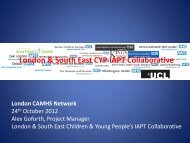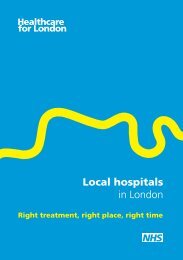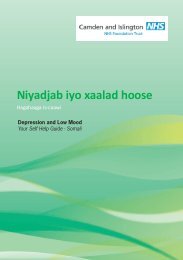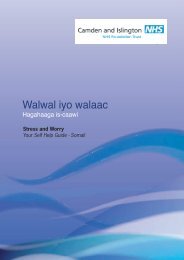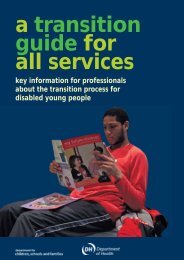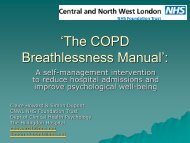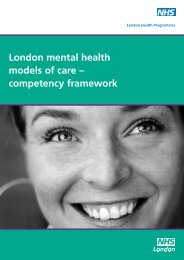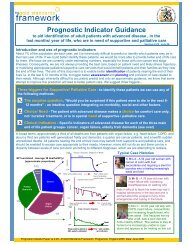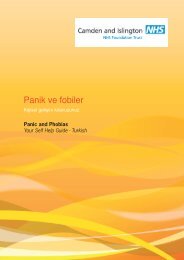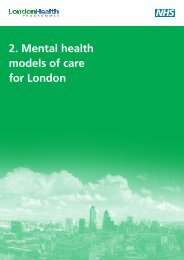NCEPOD: Trauma - Who Cares? - London Health Programmes
NCEPOD: Trauma - Who Cares? - London Health Programmes
NCEPOD: Trauma - Who Cares? - London Health Programmes
You also want an ePaper? Increase the reach of your titles
YUMPU automatically turns print PDFs into web optimized ePapers that Google loves.
9Paediatric caredefi ned children as being up to 16 years of age, but 9.8%(18/183) had a higher maximum age; the oldest being 19years of age.An Advanced Paediatric Life Support (APLS) provider wasresident or available 24 hours a day in 79.8% of hospitals(Figure 45).ProtocolsIt is recommended that protocols for the management ofpaediatric cases should be in place 1 . One hundred and fi ftyfi ve (84.7%) of the 183 sites for which an organisationalquestionnaire was returned to <strong>NCEPOD</strong> had up to dateguidelines for the management of paediatric trauma. Of the160 hospitals (87.4%) which accepted children for defi nitivecare, 23 (14.4%) did not have up to date guidelines for themanagement of children.Thirteen out of 22 (59.1%) sites that did not admit childrenfor defi nitive care had a bypass protocol in place in order toreduce the likelihood of a severely injured child being broughtto the hospital.If non-accidental injury is suspected in children, up todate guidelines on the management and referral of thesepatients should be in place. One hundred and seventy six(96.2%) hospitals had up to date guidelines on referral andmanagement of suspected non-accidental injury in children.Facilities and staffing in hospitals acceptingchildren for definitive careAs Figure 46 illustrates, the majority of hospitals acceptingpaediatric patients had a specialist in paediatric anaesthesiaand a consultant paediatrician; 70.6% (113/160) and 98.8%(158/160) respectively. Guidelines do not specify the needfor a paediatric surgical consultant at all hospitals acceptingchildren. Only 23.8% (38/160) of hospitals accepting childrenfor defi nitive care have a paediatric surgical consultant,suggesting that the transfer of patients to these sites forsurgery is often necessary.The Royal College of Surgeons of England guidelinesalso recommend that hospitals admitting children have afull range of appropriate resuscitation equipment 2 . Of theemergency departments at these hospitals 149/160 (93.2%)had a listed and checked mobile equipment kit to assist inthe resuscitation of children.It is recommended that emergency departments receivingchildren should have a children’s nurse available at all times.A Registered Sick Children’s Nurse (RSCN) was available at146/160 (91.3%) of hospitals accepting children. However,only 22 of these 146 hospitals (15.1%) had cover 24 hours aday, 7 days a week.Clearly there are diffi culties in providing all necessary staff forthe comprehensive management of the paediatric traumapatient. The data above shows problems with paediatricanaesthetic support and paediatric surgical support insome centres. This is in the context of the centralisationof many specialised paediatric services including surgery,neurosurgery and paediatric intensive care medicine.Some hospitals have acknowledged this fact by the use ofprotocols to avoid admitting severely injured children. Theuse of such protocols and close working within a network toprovide trauma care to children is required.It was recommended in the Better Care for the SeverelyInjured Patient Report 2 that “any hospital receiving and caringfor the severely injured child must have on-site support frompaediatrics’ and paediatric anaesthetists”.113




